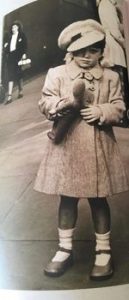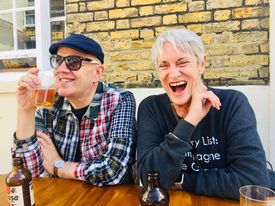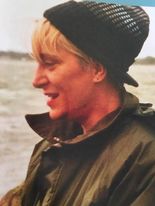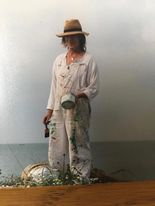


Sylvia Crowe W.I.S.E.
Sylvia Crowe was born in London’s Lambeth Hospital in 1946.
Sylvia freely admits to being born a rebel, however her life only began after a complicated birth on which she makes this comment. “It would appear that I was making absolutely no effort to be born”
Her mother’s first husband was killed in Alexandria in the first weeks of the second world war. Her first child, a girl had died at birth and her second a son died at only eighteen months old of lung disease.
She later married again but those events combined to leave her deeply traumatised. She worked at Waterloo railway station close by. It was considered a key job which came under The Essential Work Order (EWO) which had become law in March 1941. The EWO tied workers to jobs considered essential for the war effort.
There were perks as Waterloo Railway Station housed a small cinema where Sylvia would watch children’s movies on a Saturday morning. Pathe news would still be shown regardless of the audience age so Sylvia was introduced to the horrors of war when Pathe reported the liberation of German concentration camps.
Sylvia also witnessed the constant scene of activity of soldiers disembarking from trains and dashing across to the Union Jack Club. That was the large hotel in Sandwell street for enlisted members and veterans of the British Armed Services and their families. She would also see them running to catch trains back to Portsmouth possibly to catch a boat. She was also fascinated by the constant cultural differences such as the Windrush arrivals and the constant ebb and flow of uniformed travelers on the move.
In spite of the introduction of penicillin eight years earlier Sylvia’s full brother Raymond died of rheumatic fever in St Thomas’s Hospital in 1949. Sylvia was only three years old. These were difficult times and even rationing remained in effect until 1954, nine years after the war had ended.
During that time Sylvia and her mother and father (He survived until 1995) continued to live in Westminster Bridge Road near Bankside and The Globe Theatre on the River Thames. Her local landscape included such landmarks as Tower Bridge, Big Ben and The houses of parliament and those icons spanning the river such as Vauxhall and Battersea. She remembers watching trams cross Westminster bridge and Sundays which were the quiet day of the week when businesses and shops were closed and cars were few and far between.
As a child Sylvia explored the many derelict buildings that had been bombed out during the blitz in World War II. She would think nothing of climbing down into cellars. Her playground was therefore unlimited and she explored areas across several square miles of post war London. She describes herself as being ‘Feral’ and she was allowed to roam free without supervision.
Those experiences cast the commanding and charismatic character Sylvia would become. That fact is made abundantly clear when discussing those difficult times, she actually remembers not resenting her deprivations but loving the liberation and the overwhelming sense of adventure and freedom. They are conditions she continues to relish and thrive on to this day.
She attended a local school but due to family circumstances was forced to leave at fifteen. She married at nineteen and gave birth to a son when she was twenty two. It was shortly after that time when her marriage started to break down.
Her husband began a job in North London so never the less they moved there to live. It was during this period she became qualified to work with young people and she ran adventure playgrounds, youth clubs and youth projects. She finally separated from her husband supporting herself and her son independently without her husbands support.
She was determined to continue her studies at university to improve her employment potential and to regain full control of her independence. That was achieved in 1977 when her divorce was finalised.
Her turbulent life had left her extremely street wise and capable. She is shrewd and canny. Her capacity to survive and thrive had been honed in those bombed out buildings and it was on the cards that since she had the survivor skill set, she would be able to understand and support young people through similar events and traumas.
It was therefore no surprise that her interests and studies led to becoming a social worker and she ultimately devoted her time to the care of traumatised young people, many who had experienced not only social deprivation but also severe episodes of unspeakable abuse. She is moved when considering those experiences.
Her own life was going well but in spite of all her efforts, her happiness and ambitions were to be dramatically halted by a serious car accident. The car had been imported and unknown to Sylvia the seat belt had been degraded by the incessant heat of strong sunlight. When a speeding car breached a red light and crashed into them the seat belt disintegrated and Sylvia was thrown about until the car rolled to a stop. She had been seriously injured but she walked away from the accident unaware.
She became suspicious when she was traveling in Nicaragua. She was to discover that she had suffered blunt force trauma injuring her spine. Such were the injuries that they triggered lupus from which she continues to suffer.
Although her full story is astonishing and most who know her would agree would make a fascinating film script, Sylvia is humble and stoic about her life which she describes as “just rolling on, I’m simply happy to be a part of their lives” She means of course her ‘Firefighter’ son (The apple never falls far from the tree) and her three well loved grandchildren.
In spite of everything Sylvia continues to live a lively life in her beloved London. She is a popular guest at many celebrity parties where she is well known for her wicked sense of humour, intellect, wit and enthralling anecdotes derived from a fascinating life.
When asked what she would say to a younger generation she replied:
“Just take it as it comes, enjoy every day and always make a negative into a positive.”

